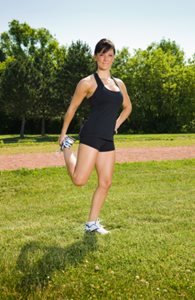Better Second Time Around

Jondelle's story is used with permission
After the birth of her first baby, Jondelle (not her real name) returned to A grade sport after only 5 weeks. Jondelle had no problems day to day with her pelvic floor muscles or bladder control. Although she always went to the toilet before a game, she experienced a small amount of urine leakage while playing, and felt damp in her underwear after a game so she needed to wear pads while she played. Then she developed a bulging down below, and found out that the front wall of her vagina, which supports the bladder, had dropped down. This was called a bladder prolapse.
Jondelle went to see the Physiotherapist when her baby was 8 months old, who advised her that because her pelvic floor muscles were still weak, she should consider stopping playing sport to allow them to recover from the birth. When Jondelle coughed, her pelvic floor dropped considerably, and the bladder prolapse increased. This indicates that any time any downwards pressure occurs on her pelvic floor muscles, then this could be happening. This may include during a cough, sneeze, while lifting her baby or anything heavier than her baby, while pushing a full shopping trolley and certainly with any bouncing or running type of activities.
Jondelle's pelvic floor exercise program included trying to work the muscles together with a cough, to aim to reduce the amount of every day pressure on the pelvic floor muscles, otherwise the prolapse would just continue to worsen over time. This took a lot of concentration, and she needed to work with the Physiotherapist to learn to do this correctly. You can try to tighten your pelvic floor muscles during these daily activities to protect them from dropping down, but if you have any difficulties doing this, or are unsure if you are doing it correctly, please seek the advice of a Physiotherapist working in the area of Women's Health.
Jondelle also needed to work on her pelvic floor muscles with exercises to strengthen them. Jondelle had not done her exercises regularly during her pregnancy, not thinking that they would affect her this way after the birth because they had weakened. Even when she returned to try sport again after her baby was 15 months old, she still experienced some leakage and felt heavy after the game in the pelvic floor area. So the effects of early return to sport can be long lasting. Jondelle needed to put a lot of work into getting her pelvic floor muscles strong again. The prolapse reduced as she did her exercises and took care with her daily and sporting activities.
During Jondelle's second pregnancy she did her pelvic floor muscle exercises diligently. She went back to the gym after 3 weeks, but did not return to sport or running. She had been focusing on using her pelvic floor muscles during the day, and also on bracing her abdominal muscles. This time she experienced no urine leakage and had not noticed a bulge in the vaginal area.
When her second baby was 7 months old, Jondelle saw her Physiotherapist for another check. Her pelvic floor muscles were still continuing to improve, and there was only a small drop of her vaginal wall when she did cough. This was much less severe than after her previous pregnancy.
Being far more aware this time around, and taking more care of her pelvic floor muscles during pregnancy, means that Jondelle didn't experience the urine leakage and prolapse like she did after her first pregnancy. Although she needed to compromise and use the gym for exercise instead of playing sport straight away, she was glad that she made this decision. She will now have a stronger pelvic floor now for years to come, after taking the time to work her pelvic floor before and after the birth.
Copyright 2011-2020. Demac Resources Pty Ltd. www.thepregnancycentre.com.au